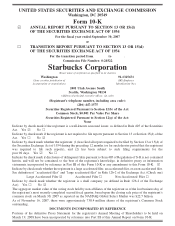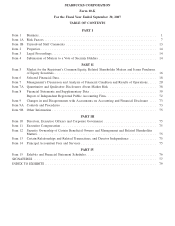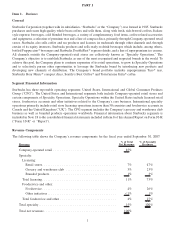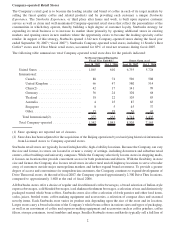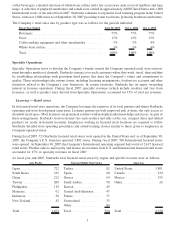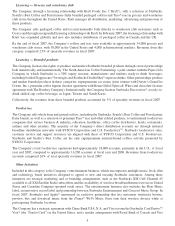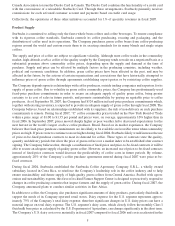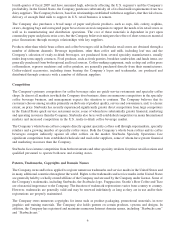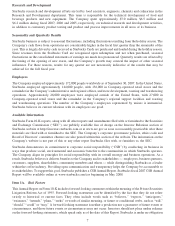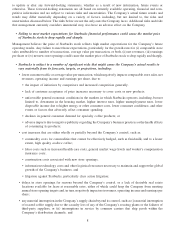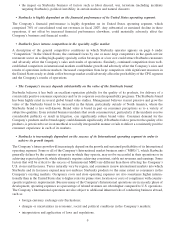Starbucks 2007 Annual Report Download - page 7
Download and view the complete annual report
Please find page 7 of the 2007 Starbucks annual report below. You can navigate through the pages in the report by either clicking on the pages listed below, or by using the keyword search tool below to find specific information within the annual report.Canada Association to issue the Duetto Card in Canada. The Duetto Card combines the functionality of a credit card
with the convenience of a reloadable Starbucks Card. Through these arrangements, Starbucks primarily receives
commissions for each activated customer account and payments based on credit card usage.
Collectively, the operations of these other initiatives accounted for 1% of specialty revenues in fiscal 2007.
Product Supply
Starbucks is committed to selling only the finest whole bean coffees and coffee beverages. To ensure compliance
with its rigorous coffee standards, Starbucks controls its coffee purchasing, roasting and packaging, and the
distribution of coffee used in its operations. The Company purchases green coffee beans from coffee-producing
regions around the world and custom roasts them to its exacting standards for its many blends and single origin
coffees.
The supply and price of coffee are subject to significant volatility. Although most coffee trades in the commodity
market, high-altitude arabica coffee of the quality sought by the Company tends to trade on a negotiated basis at a
substantial premium above commodity coffee prices, depending upon the supply and demand at the time of
purchase. Supply and price can be affected by multiple factors in the producing countries, including weather,
political and economic conditions. In addition, green coffee prices have been affected in the past, and may be
affected in the future, by the actions of certain organizations and associations that have historically attempted to
influence prices of green coffee through agreements establishing export quotas or by restricting coffee supplies.
The Company depends upon its relationships with coffee producers, outside trading companies and exporters for its
supply of green coffee. Due to volatility in green coffee commodity prices, the Company has predominantly used
fixed-price purchase commitments in order to secure an adequate supply of quality green coffee, bring greater
certainty to its cost of sales in future periods, and promote sustainability by paying an equitable price to coffee
producers. As of September 30, 2007, the Company had $324 million in fixed-price purchase commitments which,
together with existing inventory, is expected to provide an adequate supply of green coffee through fiscal 2008. The
Company believes, based on relationships established with its suppliers, the risk of non-delivery on such purchase
commitments is remote. During fiscal 2007, “C” coffee commodity prices traded on the New York Board of Trade
within a price range of $1.00 to $1.35 per pound and prices were, on average, approximately 10% higher than in
fiscal 2006. In September 2007, prices moved sharply higher as poor weather led to decreased expectations for the
next harvest in the world’s largest arabica coffee producer, Brazil. Based on its market experience, the Company
believes that fixed-price purchase commitments are less likely to be available on favorable terms when commodity
prices are high. If prices were to continue to move higher during fiscal 2008, Starbucks likely would increase the use
of price-to-be-fixed purchase contracts to meet its demand for coffee. These types of contracts state the quality,
quantity and delivery periods but allow the price of green coffee over a market index to be established after contract
signing. The Company believes that, through a combination of fixed-price and price-to-be-fixed contracts it will be
able to secure an adequate supply of quality green coffee. However, an increased use of price-to-be-fixed contracts
instead of fixed-price contracts would decrease the predictability of coffee costs in future periods. By volume,
approximately 20% of the Company’s coffee purchase agreements entered during fiscal 2007 were price-to-be-
fixed contracts.
During fiscal 2004, Starbucks established the Starbucks Coffee Agronomy Company S.R.L., a wholly owned
subsidiary located in Costa Rica, to reinforce the Company’s leadership role in the coffee industry and to help
ensure sustainability and future supply of high-quality green coffees from Central America. Staffed with agron-
omists and sustainability experts, this first-of-its-kind Farmer Support Center is designed to proactively respond to
changes in coffee producing countries that impact farmers and the supply of green coffee. During fiscal 2007, the
Company announced plans to conduct similar activities in East Africa.
In addition to coffee, the Company also purchases significant amounts of dairy products, particularly fluid milk, to
support the needs of its Company-operated retail stores. Dairy expense for the U.S. segment represents approx-
imately 75% of the Company’s total dairy expense; therefore significant changes in U.S. dairy prices can have a
material impact on total dairy expense. The U.S. segment’s dairy costs, which closely follow the monthly Class I
fluid milk base price as calculated by the U.S. Department of Agriculture, can change significantly in the short term.
The Company’s U.S. dairy costs rose materially in fiscal 2007 compared to fiscal 2006 and costs accelerated in the
5

